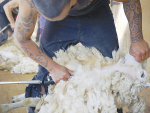Will Halliday, B+LNZ's senior advisor biosecurity and animal welfare, says in many parts of the country there are either limited or no slink collections. He says it is up to individual farmers to make their own arrangements to deal with any losses.
"We are recommending farmers contact their normal service provider and if that service is still available, to make use of it. Otherwise, farmers will need to plan ahead and put procedures in place to safely dispose of any livestock losses."
Halliday is reminding farmers of the need to locate carcase and waste disposal areas well away from paddocks, yards and sheds.
These areas need to be secure and contained to prevent access by livestock, feral and domestic animals and wildlife.
They should also be well away from waterways and water supplies.
He says composting is an option, however, it needs to be done properly. While the resulting compost can be spread on pasture, this pasture cannot be grazed while there is still visible contamination with composted material.
Halliday says rules around the burial and burning of animal waste vary between regional councils - so farmers should be aware of the regulations in their region.



















